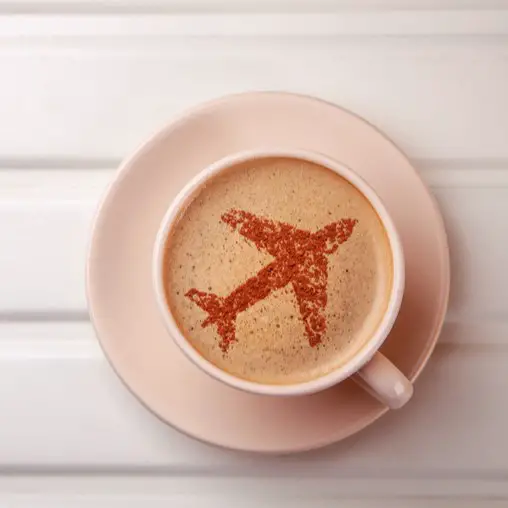There’s something seemingly comforting about a hot beverage when you’re suspended thousands of feet in the air. However, the next time the flight attendant comes around with a trolley asking if you’d like some coffee or tea, you might want to pause and consider. Despite advancements in aviation, the simple act of ordering a hot drink on a plane may not be as benign as it appears. This article will reveal why you should think twice before you order that seemingly innocent cup of coffee or tea during your next flight.
1. The Questionable Cleanliness of Water Tanks
It may shock you to learn that the water used in making coffee and tea on airplanes often comes from onboard water tanks that are not always as clean as you might hope. According to a Business Insider report, numerous studies, including one in 2019, have shown that these tanks can harbor a range of harmful bacteria and pathogens. Despite regulations requiring regular cleaning and testing, lapses do occur, leading to water quality issues.
Flight attendants, often the first insiders to avoid airplane coffee and tea, have voiced concerns about the water’s origin and handling. The process of transporting water to aircraft involves multiple stages, each introducing potential contaminants from storage tanks to the trucks that deliver water to planes.
Moreover, the cleaning frequency of these tanks is left largely to the airlines’ discretion, which can lead to inconsistent practices. An alarming finding from a 2004 EPA study highlighted that a significant percentage of tested aircraft had water systems that tested positive for coliform, an indicator of potential fecal contamination.
2. The Real Risk for Immune-Compromised Passengers
For travelers with weakened immune systems, such as those undergoing treatment for cancer, those with autoimmune diseases, or the elderly, the stakes are even higher. A specialist in infectious diseases recommended that such individuals avoid in-flight beverages made from tap water. The risk extends to infants and young children, for whom safe drinking water is crucial. A doctor’s advice against using airplane tap water for mixing baby formula or drinks is a stern warning that deserves attention.
The presence of microorganisms and the potential for contracting illnesses from them can turn a simple cup of tea into a health hazard. The consequences of consuming contaminated water can range from mild gastrointestinal discomfort to more severe, debilitating conditions, especially for those already at risk.
This issue isn’t confined to any one region or airline. Although some airlines have better track records than others, the variability in water safety protocols can make it a gamble each time you accept a hot drink aboard an airplane.
3. Alternatives to In-Flight Coffee and Tea
If the thought of drinking something that could potentially harm you is unappealing, consider alternatives. Bottled water, sealed beverages, or even bringing your own tea bags and asking for hot bottled water (if available) are safer choices. This way, you can still enjoy the comfort of a warm drink without the risks associated with tap water on planes.
Some travelers opt to bring portable water filters or purifying tablets, especially on long-haul flights where hydration is critical. While not everyone might go to these lengths, being prepared can significantly reduce health risks.
Moreover, increasing awareness about these issues has prompted some airlines to improve their standards. Checking airline reviews and water safety practices before booking your ticket can also guide your choice, ensuring that you choose an airline that prioritizes passenger health and safety.
4. A Historical Perspective on Airplane Water Safety
The concerns about airplane water quality are not new. Historical data, including the cited 2004 EPA study, have consistently pointed to issues with onboard water systems. These systems are susceptible to various forms of contamination, from the source water to the mechanisms used for delivery and storage.
Regulations have tightened over the years, with airlines now required to adhere to stricter monitoring and disinfection routines. However, as with any regulatory framework, the efficacy of these measures largely depends on diligent enforcement and compliance, which can vary widely among carriers.
This variability suggests a need for ongoing vigilance by passengers and regulatory bodies alike to maintain safe drinking standards aboard aircraft.
5. What the Crew Members Say
The firsthand accounts of airline crew members provide compelling anecdotal evidence about the quality of water used for making coffee and tea on flights. Many crew members choose not to consume these beverages, a practice based not on preference, but on knowledge of the water quality and cleaning practices.
These insights from the cabin crew can be eye-opening, as they regularly witness the behind-the-scenes aspects of in-flight service that passengers rarely see. Their reluctance to drink the water is a powerful testament to the potential risks involved.
Understanding these risks and making informed choices can significantly enhance your health and safety while flying. Listening to those who know the ins and outs of the industry isn’t just smart—it could be crucial for your well-being.
6. The Official Stance and Recent Changes
Despite the alarming revelations, it is worth noting that there have been improvements in water quality on planes. Recent regulations and technological advancements have led to better water purification systems being installed in newer aircraft. Airlines are increasingly aware of the importance of maintaining a positive reputation for quality and safety, which includes ensuring safe drinking water.
Regulatory bodies and health experts continue to push for higher standards and more transparent reporting, aiming to hold airlines accountable and ensure passenger safety. As these changes take effect, the hope is that the quality of drinking water on planes will meet the same standards as ground water. The ongoing efforts to improve water quality are a positive sign, yet passengers should remain informed and cautious.

